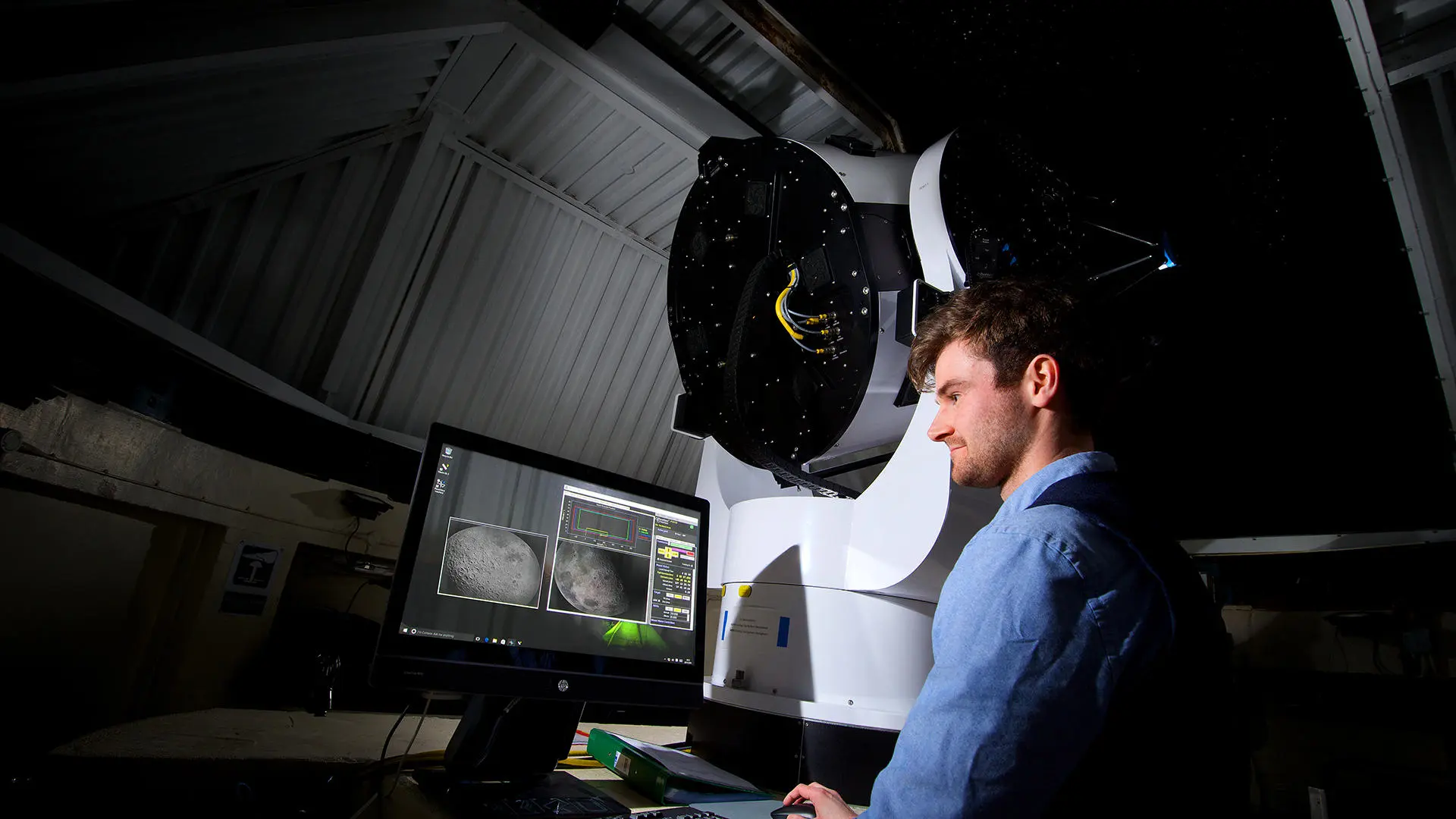Did you ever wonder how stars and galaxies came to be? An Astrophysics degree can provide the answer. You'll gain the skills, methods and knowledge to investigate the physics of our universe.
Why study with us
- 2ndin the North West for student satisfactionComplete University Guide (Physics and Astronomy)
2024 - 5thin the UK for teaching qualityTimes Good University Guide (Physics and astronomy)
2024 - 1stin the UK for teachingNational Student Survey (Astronomy)
2024
- Learn at one of the UK’s best-equipped teaching observatories, with our recent £200,000 investment in probably the most powerful modern optical telescope available in the country.
- You’ll have access to specialist laboratory facilities for the study of nuclear physics, mechanics, optics, quantum physics, laser physics, spectroscopy and astrophysics.
- You’ll develop your mathematical skills, and benefit from a state-of-the art learning environment for practical analysis, interpretation and modelling of astronomical data.
What you’ll do
- This course begins with the same introductory modules as both our Physics and Physics with Astrophysics courses, so you’ll have the flexibility to switch within your first year.
- We collaborate with some of the world’s leaders in the field, including NASA and the Southern African Large Telescope: you’ll become an active part of our vibrant research culture, learning from research-informed teaching, working on projects and even joining funded internships.
- If you’re doing well on the BSc programme, you can step up to the MPhys route – an ideal option for a career in scientific research.
Modules
In Year 3 you will study either Physics/Astronomy Project or UAS Teaching Placement.
Every effort has been made to ensure the accuracy of our published course information. However, our programmes are subject to ongoing review and development. Changing circumstances may cause alteration to, or the cancellation of, courses. Changes may be necessary to comply with the requirements of accrediting bodies or revisions to subject benchmarks statements. As well as to keep courses updated and contemporary, or as a result of student feedback. We reserve the right to make variations if we consider such action to be necessary or in the best interests of students.
Accreditations
What can you do with an astrophysics degree?
Our BSc (Hons) Astrophysics degree course provides the analytical and mathematical skills which are prized across a range of industries, as well as a strong foundation for a career in research.
Entry requirements
We will consider your educational achievements, predicted grades, work experience and personal statement. If you don't meet the grades for your chosen course, we will consider you for other programmes.
We know that many factors can influence the grades you achieve in school or college. If your life experience has affected your academic studies, we can take this into account. Use the UCAS Points Calculator below to check whether you are eligible.
Unsure if you meet our entry requirements? Contact our friendly Course Enquiries team to talk through your options.
Transfers onto later years of the degree are considered subject to compatibility.
- UCAS: 120 points at A2 including BB in Physics and Maths
- BTEC Extended Diploma: DDM only accepted alongside A-level Maths and Physics at grade BB
- International Baccalaureate Diploma: 120 points from Higher Level subjects including Higher Level 5 Maths and Physics
- T Level: M and A2 Maths and Physics at grade BB
- IELTS: grade 6 with no component lower than 5.5
- GCSEs: 5 at grade C/4 including Maths and English or equivalent
Use our UCAS points calculator
Not got the grades?
Our courses with a foundation year could be exactly what you're looking for. They provide an alternative route to study for this degree.
Fees and funding
Scholarships and bursaries
We have a wide range of bursaries, scholarships and funds available to help support you whilst studying with us.
Select your country to see eligibility information and how to apply by selecting more info on the cards below.
Care Leaver Bursary
Our Care Leaver Bursary is for students who need extra support because they have been in care or are estranged from their parents.
Find out more about Care Leaver BursaryEstranged student support
Estranged Student Support Bursary is for students who need extra support because they are estranged from their parents.
Find out more about Estranged student supportDependants Bursary
Students with financially dependent children may be eligible for our Dependants Bursary as part of our financial support package.
Find out more about Dependants BursaryFinancial support package
If you are from a low income household our Financial Bursary may be able to help.
Find out more about Financial support package
This course is delivered by the School of Engineering and Computing
For information on possible changes to course information, see our essential and important course information
You can find regulations and policies relating to student life at the University of Central Lancashire on our student contract page



